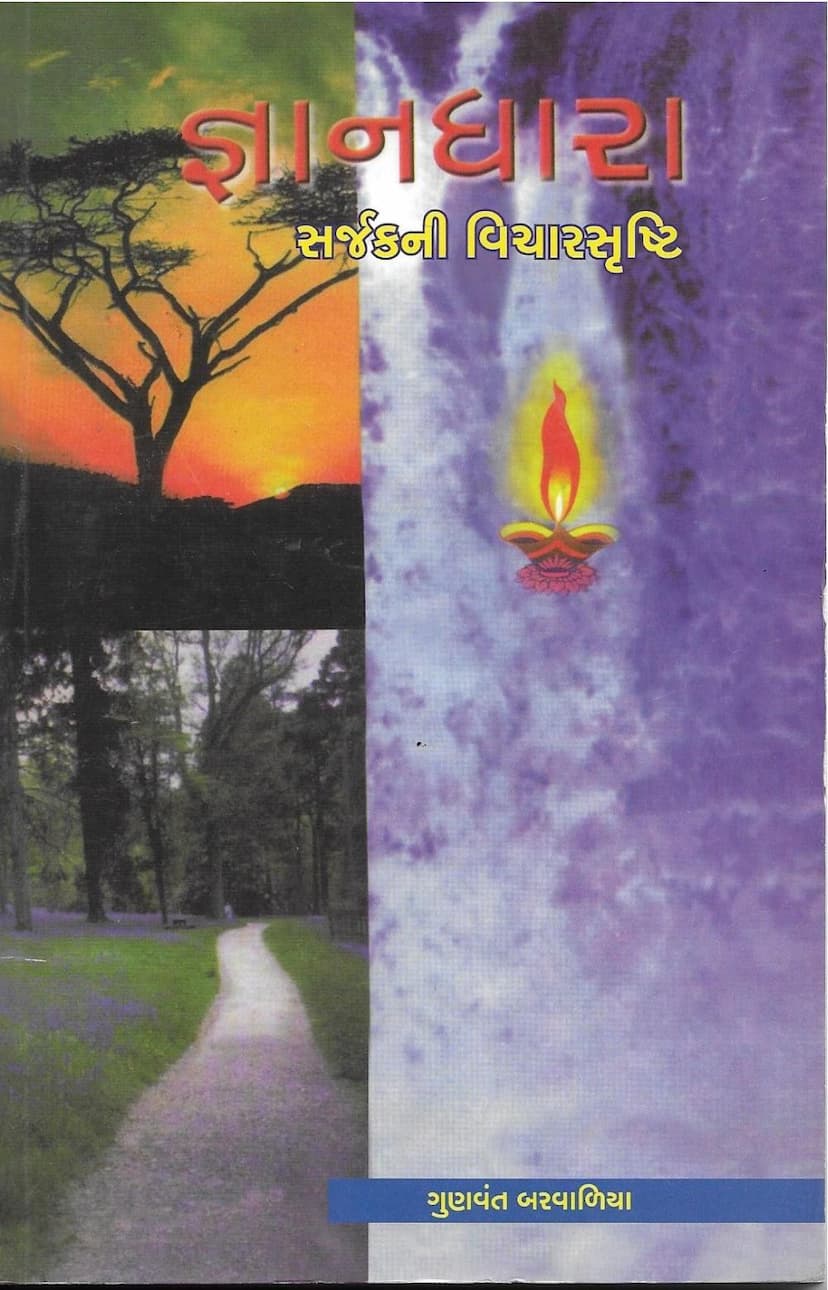Gyandhara 12 Sarjakni Vichar Srushti
Added to library: September 1, 2025

Summary
Here's a comprehensive summary of the Jain text "Gyandhara 12 Sarjakni Vichar Srushti" by Gunvant Barvalia, based on the provided pages:
Book Title: Gyandhara 12 Sarjakni Vichar Srushti (Literally: Flow of Knowledge 12 - The Creator's World of Thoughts) Author: Gunvant Barvalia (as editor) Publisher: Pravin Prakashan P L Catalog Link: https://jainqq.org/explore/034386/1
Overall Theme:
This book is a collection of research papers and essays presented by scholars at the 12th Jain Literature Knowledge Session (Jain Sahitya Gnansatra-12). The central theme revolves around exploring the "World of Thoughts of the Creator" (Sarjakni Vichar Srushti), focusing on the philosophical and literary contributions of various prominent Jain Acharyas, saints, poets, and thinkers. The book aims to present their profound ideas, life journeys, and the impact of their writings on Jain philosophy, culture, and spiritual development.
Key Content and Structure:
The book is an anthology, and its primary value lies in its diverse range of topics and authors, each contributing a specific perspective on a significant figure or concept within Jainism. The table of contents (page 4) reveals a detailed index of these contributions, highlighting the figures and their respective areas of thought:
-
Focus on "Sarjakni Vichar Srushti" (The Creator's World of Thoughts): The title itself suggests an exploration of the intellectual and spiritual landscapes of those who have shaped Jain thought and literature.
-
Scholarly Contributions: The book comprises research papers and essays from various scholars, indicating a deep dive into specific aspects of Jain philosophy and the thinkers' contributions.
-
Diverse Range of Thinkers: The table of contents lists a wide array of influential figures, including:
- Philosophers and Acharyas: Pandit Sukhlalji, Acharya Hemchandracharya, Upadhyay Yashovijayji, Acharya Shubhachandrasuri, Acharya Mahapragya, Acharya Devnandi, Acharya Somasundarsuri, Acharya Shaiyambhava Suri, Acharya Kundakunda, Acharya Amritchandracharya, and more.
- Spiritual Leaders and Saints: Shrimad Rajchandra, Pujya Bapji (Tarulata B. Mahasati), Rashtrasant Pujya Namramuni M.S., Pujya Atmanandji, Pujya Jagjivanji M.S., Pujya Jayantmuni, Munishri Ratnachandraji, Munishri Santbalji, and others.
- Literary Figures and Scholars: Virchand Raghavji Gandhi, Pandit Prabhudas Bechardas Parekh, Kavi Nanachandji M.S.
-
Specific Works and Concepts Explored: The essays delve into the "world of thoughts" of these individuals, often focusing on their key works or philosophical contributions. Examples include:
- The philosophy of Pandit Sukhlalji, emphasizing truth, society, harmony, and culture.
- The spiritual insights of Shrimad Rajchandra and his work "Atma Siddhi Shastra."
- The devotional aspects of Pujya Bapji's teachings.
- The spiritual journey of Rashtrasant Pujya Namramuni M.S.
- The philosophical teachings of Upadhyay Vinayvijayji, particularly his work "Shanta Sudharasa."
- The practical guidance of Pujya Atmanandji in "Sadhak Sathi."
- The philosophical discourse of Virchand Raghavji Gandhi on "Jain Philosophy."
- The societal and philosophical views of Pandit Prabhudas Bechardas Parekh on "Our Protective Duty."
- The humanitarian approach of Kavi Nanachandji M.S. in "The Sweet World of Humanity."
- The spiritual insights of Upadhyay Munisundar Vijayji in "Adhyatma Kalpadrum."
- The devotional verses of Munishri Ratnachandraji in "Bhavnashatak."
- The contemplative philosophy of Acharya Mahapragya in "Amurta Chintan."
- The philosophical treatise of Acharya Devnandi in "Ishtopadesha."
- The teachings of Acharya Shaiyambhava Suri, especially concerning the "Dashvaikalika Sutra."
- The life and philosophy of Acharya Hemchandracharya, as reflected in "Trishashthishalakapurushcharitra."
- The narrative wisdom of Shrimad Siddharshigani in "Upamitibhavaprapanchakatha."
- The philosophical depth of Acharya Amolakh Rushi in "Jain Tattva Prakash."
- The essence of the Gita from a Jain perspective, as expounded by Munishri Santbalji.
- The spiritual journey and teachings of Pujya Jagjivanji M.S. in "Rishabhcharitra."
- The profound philosophy of Acharya Umaswati in "Tattvartha Sutra" and "Prashamrati."
- The introspective call to self-examination by Muni Amarendra Vijayji.
-
Editorial Remarks: The introductory section (Sampadkiy) by Gunvant Barvalia expresses joy in publishing this collection for the Jain Literature Knowledge Session-12. It thanks the organizing bodies, supporting institutions (Akhil Bharatiya Shvetamber Sthanakwasi Jain Conference - Mumbai, Shri Bruhad Mumbai Sthanakwasi Jain Mahasangh), individuals involved in the organization, and the scholars who contributed their papers. A special mention is made of a separate publication covering papers on "Guru Mahima in Indian Culture."
-
Emphasis on "Shrutgnan" (Scriptural Knowledge): The editorial also carries a devotional salutation to "Shrutgnan" (scriptural knowledge), highlighting its role in providing enlightenment and guiding towards the path of liberation.
Overall Significance:
"Gyandhara 12 Sarjakni Vichar Srushti" serves as a valuable repository of Jain intellectual heritage. It showcases the depth and breadth of Jain thought, highlighting how different thinkers have interpreted and disseminated core Jain principles across various aspects of life, philosophy, and spirituality. The book aims to:
- Preserve and Promote Jain Knowledge: By collecting and publishing these scholarly works, the book ensures that the wisdom of these great figures is accessible to a wider audience.
- Encourage Further Research: It likely serves as a reference point for future studies and discussions within Jain academia.
- Inspire Spiritual Growth: The insights into the lives and philosophies of these spiritual leaders and scholars offer inspiration for personal spiritual development and the practice of Jain principles in daily life.
- Foster Unity and Understanding: By presenting diverse perspectives within Jainism, the book can contribute to a greater understanding and appreciation of the rich tapestry of Jain thought.